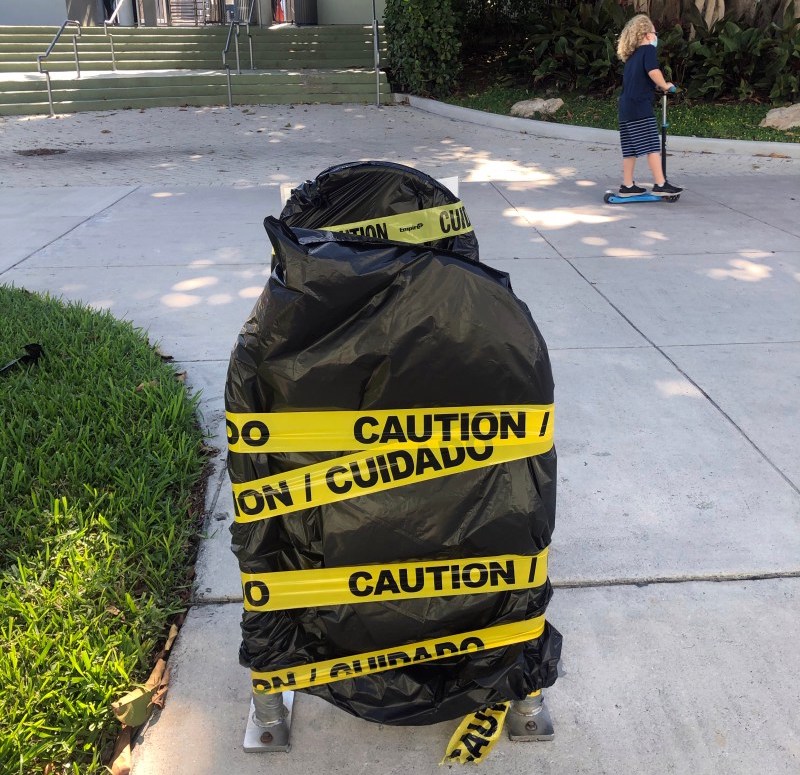Magic City mobility leaders are questioning the city’s response to active transportation during the pandemic.
By Marcia Duprat | May 19, 2020

Bike racks were made inaccessible in parks across Miami in an ill-advised response to the COVID-19 pandemic. Source: Marcia Duprat
It started with the closing of bike shops.
Early in the COVID-19 pandemic, Miami-Dade County’s COVID-19 shutdown deemed auto supply and repair shops essential — but forced the closure of bike shops. It set the stage for what has become an ongoing string of questionable policy decisions — decisions that, over time, have cemented an image of Miami as a place where car ownership affords you protection, while using greener, more socially responsible modes of transportation, like bicycles, puts you at a disadvantage.
With traffic at an all-time low, we have been afforded a brief vision of a Miami without cars, forcing us to reconsider our relationship with our hostile streets. Miamians are embracing a new normal where walking and biking is safer than usual. Moreover, with public transportation undergoing service reductions and experiencing crowding, bikes are a far safer option for many of the 90,000 households in the county who do not own a car.
Yet, the local government’s response to the crisis has unfortunately discouraged cycling as a solution.
Parks recently reopened with an unusual caveat: while parking lots remain open, the use of bike racks is prohibited. Most U.S. cities are doing exactly the opposite, banning car parking as a measure to control crowding, thereby making parks available to neighboring residents within walking and biking distance. Miami Beach was forced to learn this the hard way when it had to close one of its most iconic parks, South Pointe, less than a week after reopening.
Miami-Dade is also the only county nationwide to ban both shared bikes and shared scooters. Meanwhile, in cities from Tampa to Los Angeles, scooter- and bike-sharing companies have been offering free and low-cost trips to essential workers, taking steps to increase the frequency of sanitation, and adapting their service boundaries to be centered around the areas with the most urgent transportation needs, such as medical centers. Instead of deploying a variety of modes of transportation as a way to ease mobility during the crisis, our local government has continued the ban, putting those without a vehicle at a disadvantage.
Our most vulnerable residents often face the severest effects of these policies. Until recently, food distribution occurred exclusively in drive-through settings. All current coronavirus testing sites except two still require a car. At a time when residents are facing grave economic consequences, policymakers continue to send a clear signal: keep your car payment.
For decades Miami-Dade County has been overrun by policymaking that puts cars above every other mode of sustainable transportation. With traffic at an all-time low, now is the perfect opportunity to create safer streets for pedestrians and cyclists and a more sustainable future. Cities nationwide have been adapting their streets to accommodate social distancing, dedicate more space to outdoor restaurant seating, and expedite infrastructure projects such as wider sidewalks and new bike and bus lanes. But Miami is lagging behind or entirely absent from these trends, and car-focused road construction projects are being expedited. If this continues, the city is set to emerge from this crisis more car-dependent than before.
The stakes are high – and human. Restaurant workers returning to their jobs on bicycles. Nurses relying on transit after 12-hour shifts. Communities where park space is already lacking, locked in by dangerous streets. Our actions as we recover from this crisis can shape the city we want to move towards. In ordinary times, we strive for mobility to be the great equalizer – granting access to opportunities that can change people’s lives for the better. Amidst this crisis, we have to ensure the opposite doesn’t happen – that communities that have been left behind are connected, literally, to our recovery efforts with new pedestrian, cycling, and transit efforts.
Elected leaders and administrators need to take a hard look at how cities have adapted with policies that foster a present and a future where bicycling and safer, sustainable mobility is part of the solution – rather than the problem.
This article is authored by. Marcia Duprat is the Campaign Manager at Transit Alliance, a non-profit advocating for walkable streets, bikeable neighborhoods, and better public transit in Miami-Dade County. It is co-signed by the following:
The League of American Bicyclists, Bill Nesper
Bike Coconut Grove, Hank Resnick
Bike SoMi, Maricé Chael
Dover, Kohl & Partners, Victor Dover
Kittelson & Associates, Fabian De La Espriella
Plusurbia Design, Juan Mullerat
Please click here to view the full article online.
